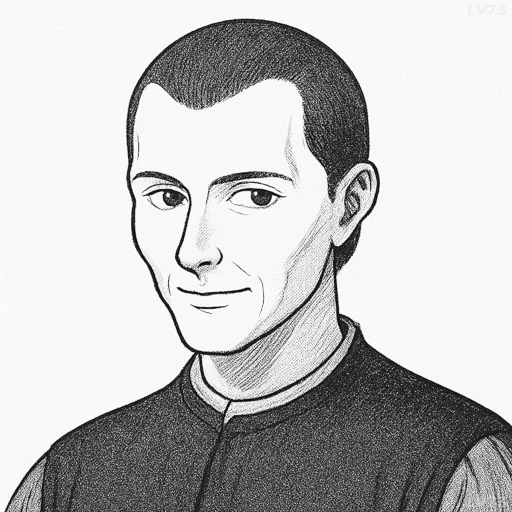“There are three kinds of intelligence: one kind understands things for itself, the other appreciates what others can understand, the third understands neither for itself nor through others. This first kind is excellent, the second good, and the third kind useless.”

- May 3, 1469 – June 21, 1527
- Born in the Republic of Florence (Italy)
- Political thinker and diplomat
table of contents
Quote
“There are three kinds of intelligence: one kind understands things for itself, the other appreciates what others can understand, the third understands neither for itself nor through others. This first kind is excellent, the second good, and the third kind useless.”
Explanation
In this quote, Niccolò Machiavelli classifies human intelligence into three categories based on an individual’s ability to understand and process knowledge. The first type of intelligence, which understands things for itself, represents the highest level of intellectual capacity. This kind of intelligence is characterized by the ability to independently analyze, evaluate, and innovate. Such individuals are able to think critically, solve problems on their own, and draw original conclusions without needing external guidance or validation. This kind of intelligence, Machiavelli argues, is “excellent” because it signifies self-sufficiency and mastery of one’s own mind.
The second type of intelligence is the ability to appreciate or understand the insights and knowledge that others have gained. While this is not as independent or innovative as the first kind, it is still a valuable trait. Individuals who possess this type of intelligence are able to recognize the worth of others’ ideas and apply them effectively in their own work or decision-making. This kind of intelligence is “good” because it fosters collaboration and allows individuals to benefit from the wisdom and experience of others, though it lacks the originality of the first type.
The third type of intelligence, which understands neither for itself nor through others, is the least valuable and is deemed “useless” by Machiavelli. This refers to individuals who are either ignorant or incapable of understanding both their own thoughts and the insights of others. These individuals may lack critical thinking skills or the ability to engage with the world in a meaningful way, and as a result, they contribute little to the advancement of knowledge or to the resolution of problems.
Machiavelli’s categorization of intelligence reflects his belief in the value of independent thinking and pragmatic action. In his political philosophy, those who are capable of understanding complex situations on their own and who can innovate or adapt their strategies based on their own observations are the most effective leaders. This idea also emphasizes the importance of practical intelligence—the ability to solve problems and make decisions in the real world, rather than just possessing theoretical knowledge. In the modern world, Machiavelli’s hierarchy of intelligence still resonates in contexts such as leadership, innovation, and education. In business, for example, independent thinkers are often valued for their ability to create new solutions and drive progress, while those who can only apply existing knowledge are seen as helpful but less crucial. Similarly, in politics, leaders who are able to think for themselves and act decisively are often seen as more effective than those who rely on the advice or ideas of others.
Would you like to share your impressions or related stories about this quote in the comments section?

